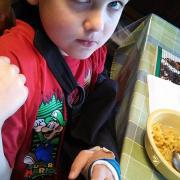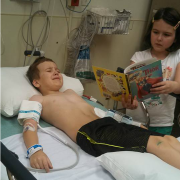My Hurting Son, Nurses in Denial, and a Message for Those in Pain
Last week, I took my six-year-old son in to have his cast removed and replaced with a new one for the final three weeks of his healing. I didn't think it would hurt. Boy, was I wrong. Between the old cast and the new cast, they x-rayed his arm to make sure the bones were still in good alignment. (They are.) They wouldn't let me in the room, so I don't know what happened in there exactly, but when he came out, he was white as a sheet, as white as he was when he first broke his arm. He told me the way they turned his arm hurt. A lot.
"Oh no, you're just scared," the nurse informed him. "That didn't hurt you." She turned to me. "He's just scared."
Mmm hmmmm. Right. The next nurse put a new cast on his arm, and then decided, after it had already dried, she'd made it too close and tight between his forefinger and thumb. "I'm not going to get you with this," she said as she turned on the saw and started cutting away the plaster in small chunks between his fingers. And then, guess what? She cut right through the plaster and the saw pushed into his skin. It didn't break the skin, but he screamed, and why not? A very loud, hot, spinning saw just landed on his skin. The child is six years old.
"You're just scared," she told him. "That didn't hurt. I didn't cut you, it's just hot." She laughed. My Mama Bear hackles were rising now, but we got out of there before I lashed out. Unfortunately, the spot where she had cut away the plaster was so rough and sharp, and still too tight. But he didn't complain until 5pm.
So the next morning we were back again. This time, a different nurse shoved long metal tongs between the cast and my son's hand and pried the plaster up and away from his thumb so he could cut it off. That doesn't sound too bad, but getting it in, from the thumb side, was a very challenging angle, and skin was pinched (hard) between the metal and cast. Can you guess what the nurse said whenever my son said that it hurt? Yep.
"No, I'm not hurting you. No, you don't feel any pain. You're. Just. Scared." Over and over again, this was the only response. I'm sure this nurse is a good and kind person in general, but his chuckling denials were making me crazy. I would have accepted "It will be over soon," or "I know it hurts, but we need to do this now so you aren't hurting for three weeks." Instead, we felt ridiculed. My son was crying, my daughter was crying, and so was I by now. Every time I interjected, the nurse just smiled and shook his head at me.
By the time we were done, I could barely maintain composure until we were out of the office suite and into the hall. I dropped down into the first chair I saw and cried openly in public for the first time I can remember. I just could not get it together. My heart ached for my son, whose feelings had been repeatedly and completely invalidated, but I was also overwhelmed with the realization that this happens to so many of us--perhaps even some of you.
Earlier this month I talked about denying my own pain, which is bad enough. But when other people dismiss or minimize your very real pain, whether it's emotional or physical, that adds a fresh layer of hurt on top of everything, doesn't it? I know many of you are experiencing pain or fear right now. Perhaps it's an impending surgery. Maybe you just learned that the new treatment plan you were so hopeful about has actually failed to bring about any healing and you're back at square one. It could be financial hardship, a marital crisis, or conflict in another relationship. Perhaps you're plagued by chronic pain, or by fear for a loved one in harm's way on deployment. Maybe you have a child with special needs and you try not to worry about the future but fear creeps in and grabs hold with a vice-grip. If this is you, I'm willing to bet that many voices in your life are trying to minimize your pain or fear, perhaps to make themselves more comfortable regardless of how you really feel. May I remind you that God never does this? He will never deny your feelings. In fact, He weeps with those who weep. He is the God Who Sees. He has something to say to you today, and I promise it isn't "You're just scared."
May the following verses bring you comfort today.
“Be strong and courageous. Do not be frightened, and do not be dismayed, for the Lord your God is with you wherever you go” (Joshua 1:9).
“Fear not, for I have redeemed you; I have summoned you by name; you are mine. When you pass through the waters, I will be with you; and when you pass through the rivers, they will not sweep over you. When you walk through the fire, you will not be burned; the flames will not set you ablaze. For I am the Lord your God…” (Isaiah 43:1b-3a).
“God is our refuge and strength, an ever-present help in trouble. Therefore we will not fear, though the earth give way and the mountains fall into the heart of the sea, though its waters roar and foam and the mountains quake with their surging” (Psalm 46:1-3).
“He will have no fear of bad news; his heart is steadfast, trusting in the LORD” (Psalm 112:7).
“So do not fear, for I am with you; do not be dismayed, for I am your God. I will strengthen you and help you; I will uphold you with my righteous right hand” (Isaiah 41:10).
“For God gave us a spirit not of fear but of power and love and self-control” (2 Timothy 1:7).
“Therefore do not worry about tomorrow, for tomorrow will worry about itself. Each day has enough trouble of its own” (Matthew 6:34).
“Do not let your hearts be troubled. Trust in God; trust also in me” (John 14:1).
“Do not be anxious about anything, but in everything, by prayer and petition, with thanksgiving, present your requests to God” (Philippians 4:6).
“Cast all your anxiety on him because he cares for you” (1 Peter 5:7).
“Peace I leave with you; my peace I give you. I do not give to you as the world gives. Do not let your hearts be troubled and do not be afraid” (John 14:27).
Your pain is real. Your fear is real. But God is bigger, and He longs to comfort you. Dear friends, I pray that today you experience His peace.


